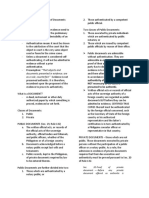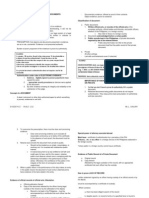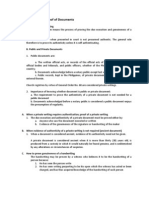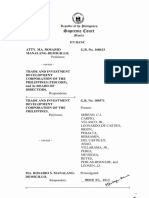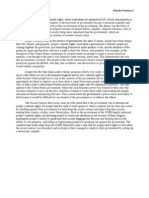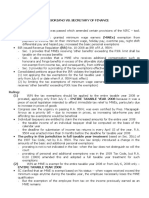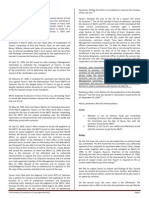II. Public Documents As Evidence and Proof of Notarial Documents Section 23
II. Public Documents As Evidence and Proof of Notarial Documents Section 23
Uploaded by
RaffyLaguesmaCopyright:
Available Formats
II. Public Documents As Evidence and Proof of Notarial Documents Section 23
II. Public Documents As Evidence and Proof of Notarial Documents Section 23
Uploaded by
RaffyLaguesmaOriginal Description:
Original Title
Copyright
Available Formats
Share this document
Did you find this document useful?
Is this content inappropriate?
Copyright:
Available Formats
II. Public Documents As Evidence and Proof of Notarial Documents Section 23
II. Public Documents As Evidence and Proof of Notarial Documents Section 23
Uploaded by
RaffyLaguesmaCopyright:
Available Formats
ADMISSIBILITY OF DOCUMENTS
I.
Classes of Documents & Proof of Private Documents
Authentication and Proof of Documents
Section 19. Classes of Documents. For the purpose of their presentation evidence, documents
are either public or private.
Public documents are:
a. The written official acts, or records of the official acts of the sovereign authority, official
bodies and tribunals, and public officers, whether of the Philippines, or of a foreign
country;
b. Documents acknowledge before a notary public except last wills and testaments; and
c. Public records, kept in the Philippines, of private documents required by law to the
entered therein.
All other writings are private.
Section 20. Proof of private document. Before any private document offered as authentic is
received in evidence, its due execution and authenticity must be proved either:
a. By anyone who saw the document executed or written; or
b. By evidence of the genuineness of the signature or handwriting of the maker.
Any other private document need only be identified as that which it is claimed to be.
II.
Public Documents as Evidence and Proof of Notarial Documents
Section 23. Public documents as evidence. Documents consisting of entries in public
records made in the performance of a duty by a public officer are prima facie evidence of the
facts therein stated. All other public documents are evidence, even against a third person, of the
fact which gave rise to their execution and of the date of the latter.
Section 30. Proof of notarial documents. Every instrument duly acknowledged or proved
and certified as provided by law, may be presented in evidence without further proof, the
certificate of acknowledgment being prima facie evidence of the execution of the instrument or
document involved.
III.
Validity of Contracts
General Rule: A defective notarization does not affect the validity of a contract.
You might also like
- Notarial Law Reviewer - EditedDocument14 pagesNotarial Law Reviewer - EditedYen PolsNo ratings yet
- Madden Hill Horse Sitting Liability FormDocument3 pagesMadden Hill Horse Sitting Liability Formapi-292194159No ratings yet
- Summary of Authentication of Documentary EvidenceDocument2 pagesSummary of Authentication of Documentary Evidencejuvpilapil100% (2)
- Post Judgment RemediesDocument9 pagesPost Judgment RemediesRaffyLaguesma100% (1)
- History of Treatment of The DisabledDocument16 pagesHistory of Treatment of The DisabledesmenziNo ratings yet
- Documentary Evidence Public DocumentsDocument2 pagesDocumentary Evidence Public DocumentsDianne MendozaNo ratings yet
- Authentication and Proof of Documents (Record Parungo)Document2 pagesAuthentication and Proof of Documents (Record Parungo)MhareyNo ratings yet
- VII. Evidence. Araneta. 11384085. AY2015-16. Atty. Custodio 1Document34 pagesVII. Evidence. Araneta. 11384085. AY2015-16. Atty. Custodio 1Aster Beane AranetaNo ratings yet
- Group 3 Evidence Authentication and Proof of DocumentsDocument10 pagesGroup 3 Evidence Authentication and Proof of DocumentsAnnaNo ratings yet
- CHAPTER XII: Documentary EvidenceDocument2 pagesCHAPTER XII: Documentary Evidencecarlo dumlaoNo ratings yet
- Authentication and Proof of DocumentsDocument6 pagesAuthentication and Proof of DocumentsJem Mutiangpili MarquezNo ratings yet
- Evidence Rule 132 (Authentication of Documents) RianoDocument4 pagesEvidence Rule 132 (Authentication of Documents) RianoWendell Leigh Oasan100% (2)
- Group 3 Evidence Authentication and Proof of DocumentsDocument10 pagesGroup 3 Evidence Authentication and Proof of DocumentsAnnaNo ratings yet
- Authentication and Proof of DocumentsDocument10 pagesAuthentication and Proof of DocumentsMaricris AmbrocioNo ratings yet
- The Role and Nature of Questioned Document Examiner in Police WorkDocument3 pagesThe Role and Nature of Questioned Document Examiner in Police WorkK ChinggusNo ratings yet
- Sec. 1, Rule Ii Acknowledgement: That He Never Appeared Were ForgeriesDocument11 pagesSec. 1, Rule Ii Acknowledgement: That He Never Appeared Were ForgeriesHeidi Fabillar Dimaangay100% (8)
- Patula v. PeopleDocument3 pagesPatula v. PeopleLourdes LescanoNo ratings yet
- Authentication and Proof of DocumentsDocument29 pagesAuthentication and Proof of DocumentsMa. Danice Angela Balde-BarcomaNo ratings yet
- Evid - Digests - Compilation - Activity 9Document88 pagesEvid - Digests - Compilation - Activity 9guanlao.catherinealexandriaNo ratings yet
- Indian Evidence Act, 1872Document20 pagesIndian Evidence Act, 1872Kshitij NawarangNo ratings yet
- T. Geral Notarial e RegistralDocument8 pagesT. Geral Notarial e RegistralEduardo LimaNo ratings yet
- UntitledDocument3 pagesUntitledJIEA THERESE SIANNo ratings yet
- Chapter IV NotesDocument12 pagesChapter IV NotesFeihl JayNo ratings yet
- Authentication and Proof of DocumentsDocument13 pagesAuthentication and Proof of DocumentsKarlo DialogoNo ratings yet
- Evidence: Rule 132, Secs. 22-24Document7 pagesEvidence: Rule 132, Secs. 22-24Deus DulayNo ratings yet
- Patula Vs PeopleDocument1 pagePatula Vs PeopleGian Tristan MadridNo ratings yet
- Civil Evidence Act 8 01Document21 pagesCivil Evidence Act 8 01Brian GoweroNo ratings yet
- SCI FalsificationDocument2 pagesSCI FalsificationMa. Mae Angelika CunananNo ratings yet
- Rule 130 Rules of AdmissibilityDocument9 pagesRule 130 Rules of AdmissibilityReve VelvetNo ratings yet
- Apostille Convention PDFDocument4 pagesApostille Convention PDFLoren Delos SantosNo ratings yet
- Legal Forms ModulesDocument15 pagesLegal Forms ModulesAbby TrayvillaNo ratings yet
- RULE 130, RRC (Full Text of The Law)Document6 pagesRULE 130, RRC (Full Text of The Law)Mendel DimaanoNo ratings yet
- Siguan v. LimDocument2 pagesSiguan v. LimTootsie GuzmaNo ratings yet
- Notarial Law Reviewer EditeddocxDocument14 pagesNotarial Law Reviewer EditeddocxNadine Reyna CantosNo ratings yet
- 69 Patula V PeopleDocument3 pages69 Patula V PeopleJuslyn Jennifer SoNo ratings yet
- I. New Notarial Rules and Practices A. A.M. No. 02-8-13-SC: January 28 Assignment Page of 1 10Document16 pagesI. New Notarial Rules and Practices A. A.M. No. 02-8-13-SC: January 28 Assignment Page of 1 10Skeith Gabriel100% (1)
- The Notarial LawDocument17 pagesThe Notarial LawAlex Malabanan PalinoNo ratings yet
- 2004 Rules On Notarial Practice & Violations: Problem Areas in Legal EthicsDocument56 pages2004 Rules On Notarial Practice & Violations: Problem Areas in Legal EthicsCharisse Louie AmoscoNo ratings yet
- Notes in Legal FormsDocument31 pagesNotes in Legal Formsjharik23No ratings yet
- Notarial Practice Term of Office of Notary Public - ADocument2 pagesNotarial Practice Term of Office of Notary Public - ARab AlvaeraNo ratings yet
- 0801updatedDocument16 pages0801updatedgeorgemagaya08No ratings yet
- PowerPoint Presentation-7 LEVDocument20 pagesPowerPoint Presentation-7 LEVmhlabane404No ratings yet
- Public and Private Documents: SECTION74-78Document9 pagesPublic and Private Documents: SECTION74-78priyaNo ratings yet
- Criminal Evidence Module 2Document8 pagesCriminal Evidence Module 2Scarlette Joy CooperaNo ratings yet
- Legal Forms MidtermsDocument32 pagesLegal Forms Midtermsjobelleann.labuguenNo ratings yet
- JOASCDocument3 pagesJOASCA LNo ratings yet
- Legal Forms ReviewerDocument7 pagesLegal Forms ReviewerSangHee Choi100% (1)
- 2004 Rules On Notarial PracticeDocument5 pages2004 Rules On Notarial PracticeAnitas LimmaumNo ratings yet
- Documentary EvidenceDocument6 pagesDocumentary EvidenceSimeon oronyiNo ratings yet
- Wing On SyyapDocument2 pagesWing On SyyapOlek Dela CruzNo ratings yet
- Section: 3 Interpretation ClauseDocument10 pagesSection: 3 Interpretation ClauseshubhamNo ratings yet
- Jurat EtcDocument19 pagesJurat Etcviovicente.ka024No ratings yet
- Legal FormsDocument6 pagesLegal FormsjianmargarethNo ratings yet
- Republic of The Phils vs. Imelda Imee Marcos-ManotocDocument4 pagesRepublic of The Phils vs. Imelda Imee Marcos-ManotocAJMordeno100% (1)
- Jurat and AcknowledgementDocument15 pagesJurat and AcknowledgementGladys OconNo ratings yet
- Notarial Law: Arcilla, Ayra Lacson, Jec Po, AlexDocument50 pagesNotarial Law: Arcilla, Ayra Lacson, Jec Po, AlexAyra ArcillaNo ratings yet
- 2004 Rules On Notarial PracticeDocument14 pages2004 Rules On Notarial PracticeJose Mari Angelo DionioNo ratings yet
- Midterms Coverage Prof Jat Caringal Block B 2016, Up Law Rule 128 General ProvisionsDocument19 pagesMidterms Coverage Prof Jat Caringal Block B 2016, Up Law Rule 128 General Provisionsanon_301689999No ratings yet
- 2004 Rules On Notarial PracticeDocument9 pages2004 Rules On Notarial PracticemarjoureeNo ratings yet
- Affidavit Under CPC Order 19 and FormatDocument3 pagesAffidavit Under CPC Order 19 and FormatMusfira Parveen JNo ratings yet
- Documentary Evidence PresentationDocument8 pagesDocumentary Evidence PresentationWangalya EdwinNo ratings yet
- Form of ContractsDocument3 pagesForm of ContractsGia DimayugaNo ratings yet
- Formal Offer of Evidence Notarial Commission JTDDocument7 pagesFormal Offer of Evidence Notarial Commission JTDRaffyLaguesmaNo ratings yet
- Motion To Lift Bench WarrantDocument3 pagesMotion To Lift Bench WarrantRaffyLaguesma67% (3)
- Circular No. 371 - Revised Guidelines On The Pag-IBIG Group Housing Loan ProgramDocument15 pagesCircular No. 371 - Revised Guidelines On The Pag-IBIG Group Housing Loan ProgramRaffyLaguesmaNo ratings yet
- Whaley Chap 3 HIDC PDFDocument76 pagesWhaley Chap 3 HIDC PDFRaffyLaguesmaNo ratings yet
- Cadastral ProceedingsDocument1 pageCadastral ProceedingsRaffyLaguesmaNo ratings yet
- Goodland Company vs. Asia United BankDocument2 pagesGoodland Company vs. Asia United BankRaffyLaguesmaNo ratings yet
- 209 - Suggested Answers in Civil Law Bar Exams (1990-2006)Document124 pages209 - Suggested Answers in Civil Law Bar Exams (1990-2006)ben_ten_1389% (19)
- Atty Manalang-Demigillo Vs TIDCORP - Reorganization of GOCC Is ValidDocument19 pagesAtty Manalang-Demigillo Vs TIDCORP - Reorganization of GOCC Is ValidRaffyLaguesmaNo ratings yet
- SC's Significant Decisions 2013-2015Document54 pagesSC's Significant Decisions 2013-2015Fritz MaandigNo ratings yet
- Calalas vs. Court of Appeals, 332 SCRA 356, May 31, 2000Document6 pagesCalalas vs. Court of Appeals, 332 SCRA 356, May 31, 2000RaffyLaguesmaNo ratings yet
- J.K. Mercado & Sons vs. Atty. de VeraDocument13 pagesJ.K. Mercado & Sons vs. Atty. de VeraRaffyLaguesmaNo ratings yet
- Fabre, Jr. vs. Court of Appeals, 259 SCRA 426, July 26, 1996Document8 pagesFabre, Jr. vs. Court of Appeals, 259 SCRA 426, July 26, 1996RaffyLaguesmaNo ratings yet
- In Re Plagiarism Case Against Justice Del CastilloDocument112 pagesIn Re Plagiarism Case Against Justice Del CastilloRaffyLaguesmaNo ratings yet
- Conlaw Divorce CasesDocument61 pagesConlaw Divorce CasesRaffyLaguesmaNo ratings yet
- 2010-2014 Political Law Bar QuestionsDocument62 pages2010-2014 Political Law Bar QuestionsRaffyLaguesmaNo ratings yet
- Definition of Terms NIRC Tax CodeDocument5 pagesDefinition of Terms NIRC Tax CodeRaffyLaguesmaNo ratings yet
- John Locke EssayDocument1 pageJohn Locke EssayMarsha Pominova0% (1)
- Whistle Blower Policy: Bridgestone India Private LimitedDocument8 pagesWhistle Blower Policy: Bridgestone India Private LimitedRajiv GuptaNo ratings yet
- Taxation Review - Soriano vs. Secretary of FinanceDocument2 pagesTaxation Review - Soriano vs. Secretary of FinanceMaestro Lazaro100% (2)
- PALS Civil ProcedureDocument150 pagesPALS Civil ProcedureLou Corina Lacambra100% (2)
- Local Administration MCQ'SDocument26 pagesLocal Administration MCQ'SGuruKPO79% (14)
- Glenn Funk Statement On AG InvestigationDocument2 pagesGlenn Funk Statement On AG InvestigationUSA TODAY NetworkNo ratings yet
- K-F-R-F-, AXXX XXX 533 (BIA June 14, 2016)Document7 pagesK-F-R-F-, AXXX XXX 533 (BIA June 14, 2016)Immigrant & Refugee Appellate Center, LLCNo ratings yet
- Joanne Kristine G. Pimentel, Petitioner, vs. Reynaldo Adiao, Cristy Adiao-Nierves and Christian Adiao, Respondents. ResolutionDocument5 pagesJoanne Kristine G. Pimentel, Petitioner, vs. Reynaldo Adiao, Cristy Adiao-Nierves and Christian Adiao, Respondents. ResolutionAyesha Elloren100% (1)
- IPIC TreatyDocument16 pagesIPIC TreatyUtsav SharmaNo ratings yet
- Htaimrb Form16 54079Document6 pagesHtaimrb Form16 54079Akhil AggarwalNo ratings yet
- 71 - Harvey v. Defensor-Santiago, 162 SCRA 840Document3 pages71 - Harvey v. Defensor-Santiago, 162 SCRA 840gerlie22No ratings yet
- Kerala Public Service Commission: Ranked List For The Post of P.D. Teacher (Male Only) ON N Jail Department NotificationDocument3 pagesKerala Public Service Commission: Ranked List For The Post of P.D. Teacher (Male Only) ON N Jail Department NotificationAnjali sasiNo ratings yet
- SCSC015554 - Judgment Against Sac City Woman in The Amount $1,419.12 PDFDocument16 pagesSCSC015554 - Judgment Against Sac City Woman in The Amount $1,419.12 PDFthesacnewsNo ratings yet
- Guijarno vs. CIR DigestDocument3 pagesGuijarno vs. CIR DigestMichelle Montenegro - Araujo100% (1)
- Prevention of Corruption Act.1988 PDFDocument12 pagesPrevention of Corruption Act.1988 PDFravi vishwanathNo ratings yet
- 20MD0094 (Re-Bid) - SADAAN-CENTRAL GLAD BY-PASSDocument111 pages20MD0094 (Re-Bid) - SADAAN-CENTRAL GLAD BY-PASSPalanas A. VinceNo ratings yet
- Essay Prompt PracticeDocument2 pagesEssay Prompt Practiceapi-297350857No ratings yet
- History March 3 CzechoslovakiaDocument1 pageHistory March 3 CzechoslovakiaAnna VieeNo ratings yet
- The High Court of Madhya Pradesh RULES, 2008Document137 pagesThe High Court of Madhya Pradesh RULES, 2008CIJO JOBNo ratings yet
- (Peter C. Holloran) Historical Dictionary of The P (B-Ok - Xyz) PDFDocument697 pages(Peter C. Holloran) Historical Dictionary of The P (B-Ok - Xyz) PDFFüleki Eszter100% (1)
- SOP For Handling Writ Petition in Case of Faceless Assessments - Taxguru - inDocument6 pagesSOP For Handling Writ Petition in Case of Faceless Assessments - Taxguru - inAjitesh RadhakrishnanNo ratings yet
- British American Tobacco Vs Camacho 562 SCRA 511 DIGESTDocument8 pagesBritish American Tobacco Vs Camacho 562 SCRA 511 DIGESTMaica MahusayNo ratings yet
- Final Compilation For Civ ProDocument48 pagesFinal Compilation For Civ ProchachiNo ratings yet
- Vda. de Jacob v. CA, GR 135216Document8 pagesVda. de Jacob v. CA, GR 135216Peter RojasNo ratings yet
- Estrada OaniDocument26 pagesEstrada OaniAerith AlejandreNo ratings yet
- Report by Adiba KhanDocument35 pagesReport by Adiba KhanadibaNo ratings yet
- Whatnext Edutech LLP: Salary Slip For February - 2020Document1 pageWhatnext Edutech LLP: Salary Slip For February - 2020NAVEEN ROYNo ratings yet
- 48 Schuartz Vs CADocument4 pages48 Schuartz Vs CAJoy Navaja DominguezNo ratings yet










